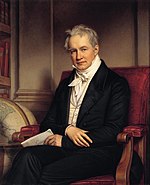Alexander von Humboldt, Date of Birth, Place of Birth, Date of Death
TweetAlexander von Humboldt
Prussian geographer, naturalist and explorer
 Date of Birth: 14-Sep-1769
Date of Birth: 14-Sep-1769
 Place of Birth: Berlin
Place of Birth: Berlin
Date of Death: 06-May-1859
Profession: scientist, astronomer, naturalist, chamberlain, polymath, zoologist, geologist, geographer, climatologist, ornithologist, ethnologist, botanical collector, meteorologist, botanist, oceanographer, travel writer, science writer, volcanologist, Geheimrat, essayist, explorer, demographer, mineralogist, patron of the arts
Nationality: Germany
Zodiac Sign: Virgo 
About Alexander von Humboldt
- Friedrich Wilhelm Heinrich Alexander von Humboldt (14 September 1769 – 6 May 1859) was a Prussian polymath, geographer, naturalist, explorer, and influential proponent of Romantic philosophy and science.
- He was the younger brother of the Prussian minister, philosopher, and linguist Wilhelm von Humboldt (1767–1835).
- Humboldt's quantitative work on botanical geography laid the foundation for the field of biogeography.
- Humboldt's advocacy of long-term systematic geophysical measurement laid the foundation for modern geomagnetic and meteorological monitoring.Between 1799 and 1804, Humboldt travelled extensively in the Americas, exploring and describing them for the first time from a modern scientific point of view.
- His description of the journey was written up and published in an enormous set of volumes over 21 years.
- Humboldt was one of the first people to propose that the lands bordering the Atlantic Ocean were once joined (South America and Africa in particular).
- Humboldt resurrected the use of the word cosmos from the ancient Greek and assigned it to his multivolume treatise, Kosmos, in which he sought to unify diverse branches of scientific knowledge and culture.
- This important work also motivated a holistic perception of the universe as one interacting entity.
- He was the first person to describe the phenomenon and cause of human-induced climate change, in 1800 and again in 1831, based on observations generated during his travels.
Read more at Wikipedia
See Also
- Famous People's Birthdays on 14 September, Germany
- Famous People's Birthdays in September, Germany
- Famous scientist's Birthdays on 14 September, Germany
- Famous scientist's Birthdays in September, Germany
- Famous astronomer's Birthdays on 14 September, Germany
- Famous astronomer's Birthdays in September, Germany
- Famous naturalist's Birthdays on 14 September, Germany
- Famous naturalist's Birthdays in September, Germany
- Famous chamberlain's Birthdays on 14 September, Germany
- Famous chamberlain's Birthdays in September, Germany
- Famous polymath's Birthdays on 14 September, Germany
- Famous polymath's Birthdays in September, Germany
- Famous zoologist's Birthdays on 14 September, Germany
- Famous zoologist's Birthdays in September, Germany
- Famous geologist's Birthdays on 14 September, Germany
- Famous geologist's Birthdays in September, Germany
- Famous geographer's Birthdays on 14 September, Germany
- Famous geographer's Birthdays in September, Germany


